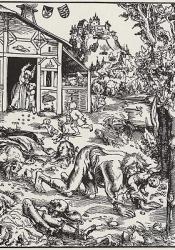S. Baring-Gould publishes “The Book of Were-Wolves”
The Book of Were-Wolves by the Reverend Sabine Baring-Gould is a collection of werewolf folklore and mythology originally published in 1865 by Smith, Elder & Co. The text investigates the various mentions of werewolves from “ancient writers of classic antiquity,” “Northern Sagas,” and “mediæval authors,” to create a “sketch of modern folklore relating to Lycanthropy” (Baring-Gould 6). Born in 1834 in Devon, England, Baring-Gould was a theologian, hagiographer, novelist, linguist, and collector of folk songs, as well as a composer of hymns, his most famous being “Onward Christian Soldiers.” He was ordained as an Anglican Priest in 1865. Baring-Gould’s uniquely diverse talents are represented in The Book of Were-Wolves, as various chapters pull from oral traditional tales, folk songs, historical accounts, and medical documentation that link lycanthropy to the real world. Baring-Gould attempts to associate lycanthropy with cannibalism, spiritual possession, and madness to reveal “that under the veil of mythology lies a solid reality, that a floating superstition holds in solution a positive truth” (Baring-Gould 6). This text would have been an excellent reference for Clemence Housman when writing The Were-Wolf.

